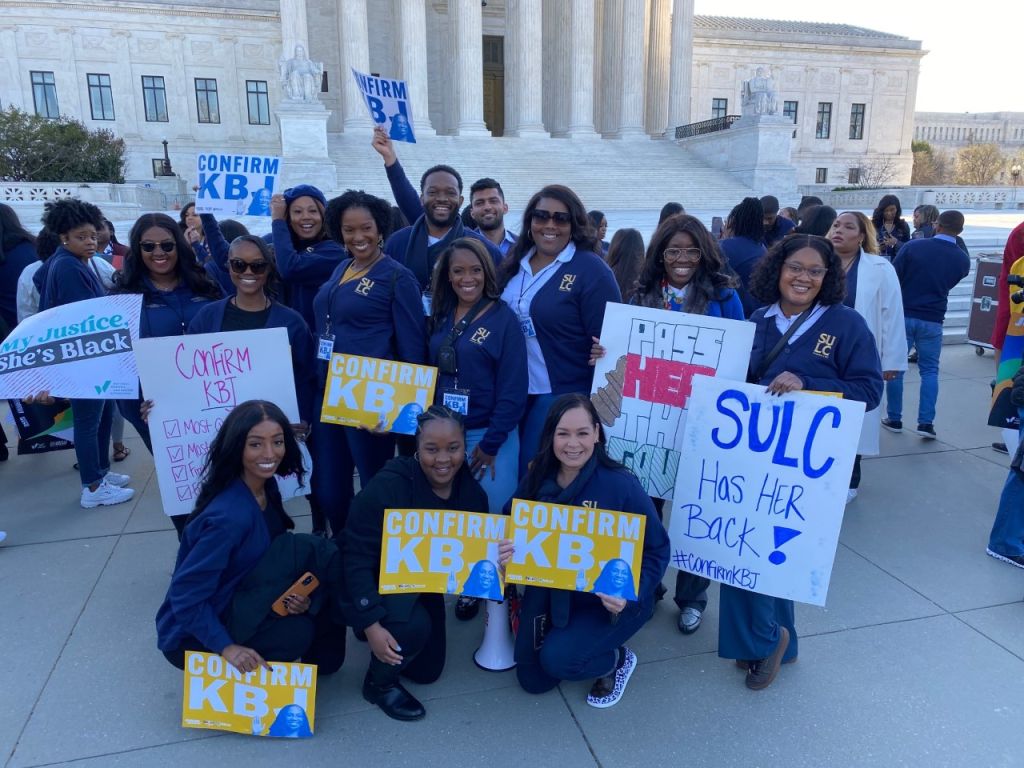SCOTUS Nomination Gives Black Law Students ‘Hope’
Source: Demand Justice / Demand Justice
While there has been much discussion about the historic nature of Judge Ketanji Brown Jackson‘s nomination, the importance of her nomination to Black law students cannot be stated enough. ABC News reported that over 100 Black law students from 17 schools went to Washington D.C. to show support for Jackson.
According to Demand Justice, the convergence in Washington D.C. is a partnership with the National Black Law Students Association and the Black Public Defender Association. Groups of students are participating in actions on Monday and Tuesday, the first two days of confirmation hearings.
As a former attorney and one-time BLSA member seeing Black law students centered at this moment is powerful. There are many obstacles and choice points in law school that can make Black students question whether they belong in their institution of choice and even in the profession itself.
Source: Demand Justice / Demand Justice
Now, a new generation of Black lawyers showed up to support Jackson’s confirmation alongside Black public defenders and other legal professionals.
“@WeDemandJustice welcomed #SULC students to Washington with a dinner reception before Monday’s Day of Action in support of the first day of hearings for #JudgeKetanjiBrown Jackson. Students are networking with public defenders, Judge Richard Boulware and policy professionals.
@WeDemandJustice welcomed #SULC students to Washington with a dinner reception before Monday’s Day of Action in support of the first day of hearings for #JudgeKetanjiBrown Jackson.
Students are networking with public defender’s, Judge Richard Boulware and policy professionals. pic.twitter.com/UQxAdwVEba
— SU Law Center (@SouthernULaw) March 21, 2022
Second-year law students Stacie Dukes and Rana Freeman, both attending Southern University Law Center, shared with NewsOne the importance of showing support for Judge Ketanji Brown Jackson. A first-generation law student, Dukes said she thought being an attorney was out of reach for her. There were no lawyers in her community growing up.
Dukes worked as a licensed mental health counselor with incarcerated people before attending law school. She said the experience of working alongside attorneys helped her find the courage to follow her dream of becoming an attorney.
Source: Demand Justice / Demand Justice
Being in D.C. alongside other Black law students and legal professionals reaffirmed Duke’s decision.
“As I prepare to leave law school, witnessing this historic nomination is further confirmation that the sky is the limit,” Dukes said. “While the statistics say otherwise, the reality is, Judge Ketanji Brown Jackson’s story is my story. When I see future Justice Jackson, I see promise. I see hope. I see change. I see opportunity. I see the possibility that despite the seemingly unrewarded and unrelenting sacrifices of my grandparents, parents and my personal struggles being treated as inferior simply because of my melanated skin, I am enough. Because of Judge Jackson, I can.”
Freeman noted the importance of representation for Black women and the judiciary. “Representation matters, Judge Ketanji Brown Jackson matters, I matter and Black women matter,” Freeman said.
Wanting to be a Judge from age seven, Freeman said she knew it was her destiny.
“KBJ’s nomination means hope,” Freeman continued. “It means glass ceilings are being shattered, showcasing that Black women are a force to be reckoned with, and change is near. It solidifies my destiny.”
Hailing from Florida A&M University, third-year law student Jasmine McMillion echoed Freeman and Dukes. She also noted the importance of Jackson’s background and experience in analyzing the Constitution.
“As a law student, we’re in the classroom read Constitutional law, constantly reading these old opinions from 1865, and seeing how the law changes and evolves,” McMillion said. Adding Jackson to the Court provides another possibility for change in how the Constitution is understood.
Source: Demand Justice / Demand Justice
Supporting the first Black woman Supreme Court nominee during Women’s History Month is like icing on the cake for McMillion. And while Jackson alone cannot change the trajectory of the Court, her presence and background can help expand the discourse around constitutional protections and fundamental rights.
‘It’s just good to have a real rounded individual on the Supreme Court who can see the law and argue laws in different ways and from a different viewpoint,” McMillion continued. “I believe the Supreme Court should represent the American people. So to represent the American people, you have to have come from all aspects of life.”
SEE ALSO:

